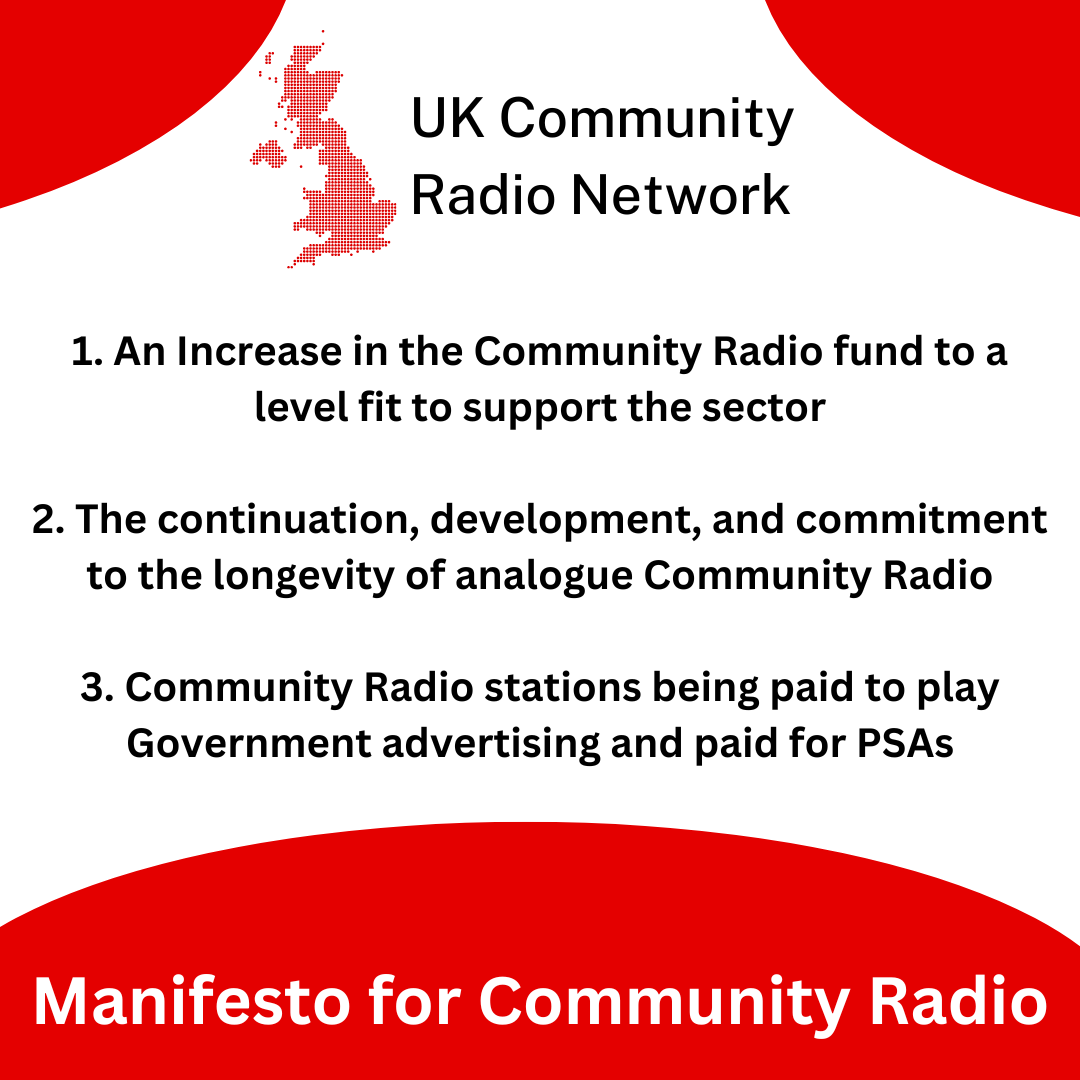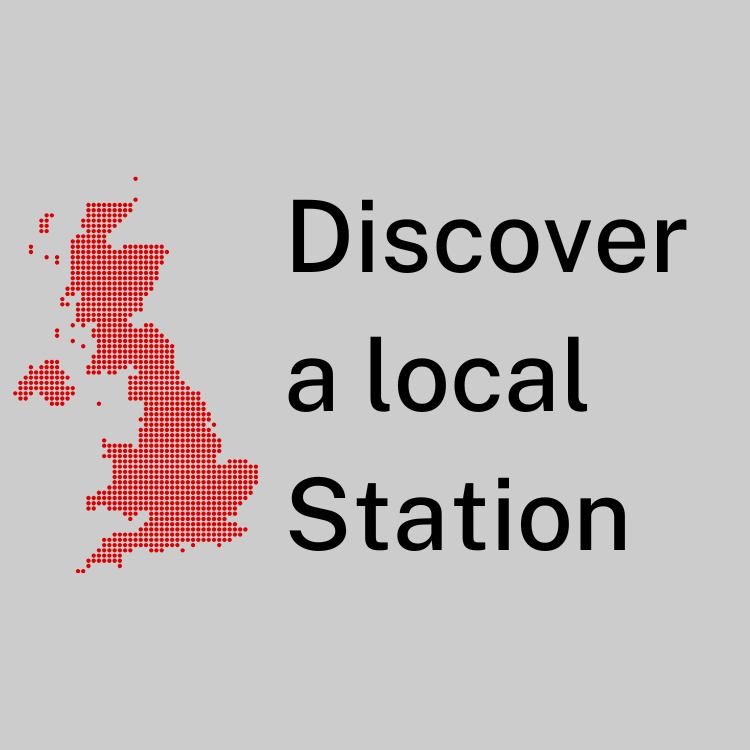

Foreward about the UK Community Radio Network and Community Radio in the UK
The UK Community Radio Network is the national organisation that represents, supports, and develops Ofcom licenced Community Radio.
Next year Community Radio turns 20 years old, and in that time it has grown from a dozen access pilot stations to a sector of over 350 licenced stations, serving a variety of communities across the UK, from communities of location, to communities of interest or identity.
They play a vital role in supporting their communities, providing information, news and whats on, offering a platform for organisations, charities and individuals to come on and talk about what they are doing for their community, they help support the development of the local economy by providing opportunities of skills development, as well as the promotion of local businesses and entrepreneurial activities, and all stations are not for profit and have a requirement to provide social gain for their community.
These stations are more vital for their local communities than ever before, in the past 20 years we’ve seen the decline in ‘local’ commercial radio, with hundreds of studios closing across the country and a homogenisation of local brands into 3 or 4 national brands, and now local BBC has shifted to provide less local radio than it ever has, and this has caused an increase in demand from audiences for local content and local provision of radio.
The next Government needs to look at how it plans to support the current state and the development of Community Radio across the UK.
We are asking parties, party leaders, and candidates to support:

Further detail and background of our manifesto
The community radio fund should see a significant increase as it’s the only funding that is exclusively available to support Community Radio stations. It currently stands at £400,000 per year, and has seen no real rise since its inception.
The fund was launched in 2005 to help support the core costs of running an Ofcom licenced community radio station, back then there were only a dozen or so stations, with an expectation that there was around £25k per station to help support them. Since the fund's launch it has had no substantial permanent uplift or increase, it has received uplifts the last few years due to Covid support and some limited reallocation of funding from DCMS.
If the fund had kept up with inflation it should be worth more than £1m now, had it kept up with the number of stations on-air it should be worth at least £8m now. We need a significant increase in the Community Radio Fund and we need the fund to be kept in line with inflation. This is a vital resource which supports the development of Community Radio, and helps it deliver vital social gain to its communities.
In 2021 DCMS commissioned an evaluation of the Community Radio Fund. Amongst its findings was how the CRF can help develop the long-term income and sustainability of Community Radio stations, seeing an average increase in income of around 37%, and over half of stations reporting an increase in their unrestricted reserves to help them develop and sustain themselves should they experience any downturn in other income streams.
This shows that the fund can be a catalyst for growth for individual stations and for the sector more widely, helping it become more sustainable. A substantial and permanent increase has the possibility for significant impact on the Community Radio sector, especially as we continue to see the sector grow with more stations launching all the time, especially as more routes to broadcast (via Small Scale DAB) are opened up. Strengthening this fund would enable more communities to be supported.
In addition to more resources, the funding also needs to enable longer-term commitments. As such, the Community Radio Fund should also be opened up to provide grants longer than for one year. For many stations that use the fund to employ a member of staff (for an income generation, business development, or grants development role), a one-year grant is not long enough to establish itself and make the role self-sustaining. A two or three-year grant period would make these roles more sustainable and make the return on investment to the sector more beneficial.
The Community Radio Fund should also be opened to provide funding for journalism and the generation of local news, as per the recommendation by the DCMS select committee in their inquiry into the sustainability of local journalism https://committees.parliament.uk/publications/33635/documents/183838/default/
2. The continuation, development, and commitment to the longevity of analogue Community Radio
In this area, we believe the following needs to happen for analogue Community Radio to be successful and thrive.
In 2025, we will see the 20 year anniversary of the first Community Radio stations, and with the current 20-year limit on the length of licences, we could see those first stations start to go silent. We need to see the licence limit cap removed, and 10-year renewal periods offered instead of the current 5 years that make long term planning, funding and support a challenge to achieve.
Since the first stations were licenced not only have local areas increased, due to population growth, or the merging of areas to form larger district councils, council councils or unitary authorities, but the nature of local radio has changed. We’ve seen the merging of ‘local’ commercial licences into quasi-regional or quasi-national brand. This trend is likely to continue with the changes brought about via the recent Media Bill. In addition ‘local’ BBC is less local than it’s ever been, with many areas now sharing programming across stations in the afternoons, evenings, and weekends. For communities to be better served by local Community Radio stations they need to be allowed to increase their coverage, both from a technical perspective (e.g. increase in power, or relays), but also from an editorial perspective (allowing stations to officially include areas in their target coverage).
Ofcom has not done a fully open UK-wide licencing programming for analogue Community Radio for nearly a decade and in that time there has been significant evidence of demand for groups wanting to launch on FM or AM in areas across the UK, including those who have no other choice than to broadcast only online, or wait until Small Scale DAB (SSDAB) is open in their area.
We need a firm commitment and long-term plan for FM Community Radio so that stations can plan and prepare for the future, when we talk to stations all can see a long life left for FM to serve communities across the UK, and we have yet to see what digital rollout across the country looks like, we are sceptical that SSDAB will ever be able to replace the actual receivable coverage of existing analogue Community Radio stations, and there are already some stations and communities that will never be served by SSDAB.
3. Community Radio stations being paid to play government advertising and paid for PSAs
Currently very few if any Community Radio stations ever receive bookings to play government advertising or PSAs (Public Service Announcements). As a result, these messages are not being served to a wide array of communities across the country, and some of these communities are diverse, deprived, and use Community Radio as a vital service for news & information.
In the last twelve months, the government has spent over £10million pounds on commercial radio. Even a small percentage of that spending being delivered towards Community Radio could inject sustainable and much-needed income into the sector, and also make sure Community Radio audiences do not miss out on vital communications.
This can be solved by political means, as the UK government advertising agency will not deal with Community Radio stations directly, or they use RAJAR as the gatekeeper for access. RAJAR is too expensive and not suitable for most Community Radio stations, so a better solution, and a commitment from government for this spending, must be forthcoming.



The UK Community Radio Network is a registered Community Interest Company | Company Number: 13700623
Powered by Radiofinity. Login